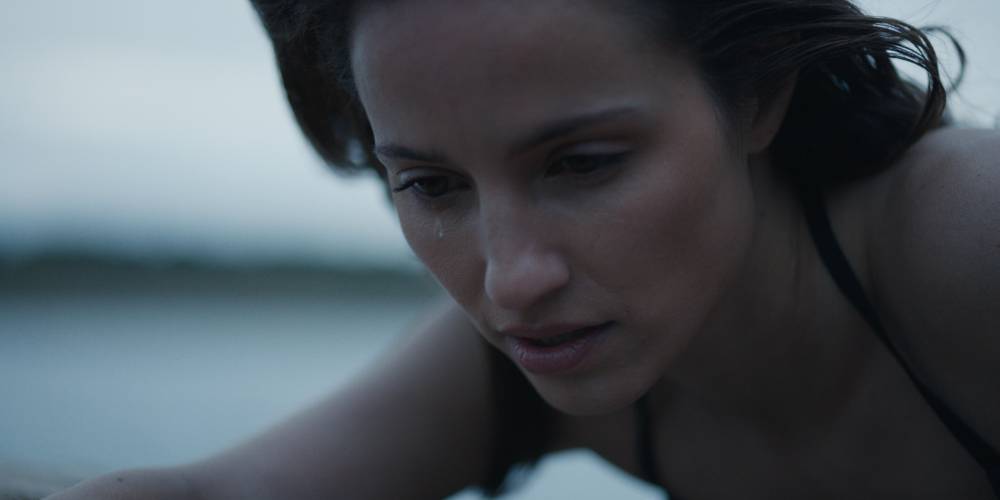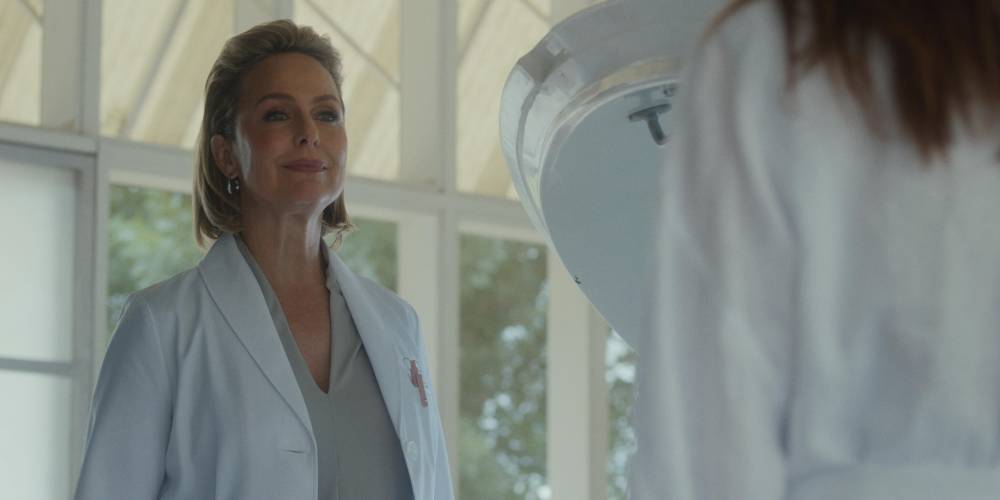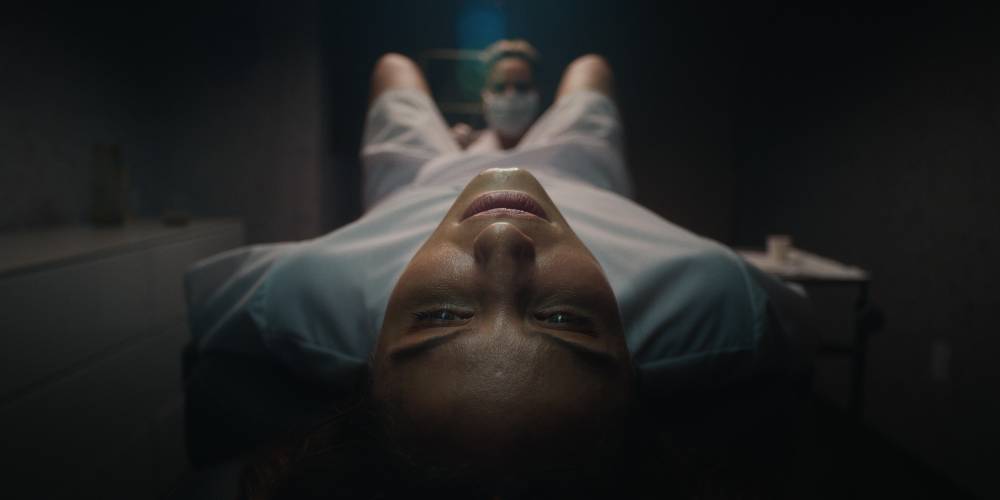Writer/director Alexis Jacknow’s feature debut boasts strong craft and a stupendous, frightening turn from Diana Argon as a woman coming undone.
From Rosemary’s Baby in 1968 to 2021’s False Positive, Hollywood has long been interested in women’s bodies and reproductive systems as a setpiece for horror: and writer-director Alexis Jacknow’s Clock is no exception. From its humble beginnings as a short film, Jacknow’s freshman feature has blossomed into a chilly, paranoia-ridden horror flick commanded by a captivating lead in Diana Agron. Though Clock‘s script is sometimes inelegant and clunky, it boasts enough personality, perspective, and ferocity to stand an exciting feature debut in the world of horror.
Expanded from Jacknow’s short, Clock follows 38-year-old Ella (Agron), a successful interior designer and the only one of her married friends without a baby. Though she’s happily married to her husband, Aiden (Jay Ali), and content to live a child-free life, she’s hyper-aware that both Aiden and her father, Joseph (Saul Rubinek), have their hopes up that she’ll catch baby fever. Pressured by feelings of inadequacy around her friends and loved ones, Ella agrees to undergo a series of breakthrough treatments to try and get her biological clock finally ticking before she’s too old: a mysterious set of therapies and medications that soon take a disturbing toll on her sanity.

What’s immediately clear about Clock is writer-director Jacknow’s passion for Ella as a protagonist: she’s more than fully realized—she’s an achingly familiar shadow of someone you know—if not someone you are. Plagued by generational guilt, self-loathing, and a heaping dose of insecurity, Ella’s dilemma isn’t that she doesn’t have a baby: it’s that she doesn’t want one.
It takes a lot of vulnerability and strength as a writer to admit a truth many women feel but can’t quite voice: some of us don’t want to have children. Clock takes this idea and warps it through a horror/psychological thriller lens. After a series of experimental treatments and medications leave Ella with visions and entering hysteric fugue states, her world begins to break down, and her sanity merges with her fears. It’s a visceral, horrifying viewing experience crafted by Jacknow’s all-encompassing direction and Alexandra Amick’s snappy editing.
In terms of scares, that’s not quite what works here. There are certainly conventional Conjuring or Insidious-style jump scares (complete with a “tall woman” who bears particular resemblance to the former franchise’s recurring Nun). Still, none of them feel particularly earned or even necessary. Instead, the horror is most effective when we see the differences between reality and what Ella thinks is going on: and often because we’re presented with her version of events before the truth.

Unreliable narrators in horror are always delightful. Ella makes for a particularly effective one thanks to how strong of a lead she is on the page and to Diana Agron (Shiva Baby scene stealer and Glee alum) ‘s whirlwind horror heroine turn. Ella’s story is so frightening because she’s so familiar: she starts the film out a competent, content married professional with a thriving career and sense of self. Her is so elegantly executed on Agron’s part that you don’t wholly notice how off the rails things are until it’s too late—a mark of both Agron’s acting prowess and Jacknow’s writing.
It also helps that the Clock’s ensemble cast is filled with compelling (if not particularly original) characters: Ell’as Jewish father (Rubinek), whose connection to their shared family legacy of trauma eventually drives her to psychological extremes. Again, it’s difficult to emphasize how personal Ella as a character feels to Jacknow’s perspective: there’s a visceral fury and gravity with which she carries the family’s generational trauma. It adds another layer to the other pressures for a baby: not only is the urge to fit in, but it’s also to continue a family line that was almost exterminated.

Of course, not all the storylines are as compelling: Ella’s romance/relationship with Aiden feels underbaked and arbitrary compared to her relationship with her father and the pressures imposed by her social circles. Aiden, too, seems to turn on a dime (as many a thriller boyfriend has) when Ella’s mental health takes a turn for the worst: of the significant elements in Ella’s life, it’s Aiden who could do with the most narrative work.
But where Clock soars is in its unrelenting imagery and pill-induced visions: behind which is Melora Hardin’s mesmeric Dr. Simmons, the woman conducting the “breakthrough” medical trial Ella undergoes. Dr. Simmons recalls a cult leader with her charisma and ability to talk her way under your skin: when Ella begins having steadily more appalling visions, Dr. Simmons is there to gaslight her (and the audience) into thinking it’s all just part of the process.
In some key places, Clock does admittedly struggle (the arbitrary, uninspired jump scares and the clunky first-act dialogue are most vexing), which serve as infrequent but noticeable reminders that this, in fact, a first-time feature filmmaker. But Clock‘s narrative strength and artistry are undeniable. Though its messaging may sometimes be unsettling and strange, Jacknow has a sharp edge, and Agron has a magnetic quality that build an intoxicating little nightmare of a film.
Clock premiers Friday, April 28th, on Hulu.
Clock Trailer:
Read next: The Spool's Best New Releases
Streaming guides
The Best Live TV Streaming Services With Free Trial
The praises of live TV streaming services don’t need to be further sung. By now, we all know that compared to clunky, commitment-heavy cable, live TV is cheaper and much easier to manage. But just in case you’re still on the fence about jumping over to the other side, or if you’re just unhappy with ... The Best Live TV Streaming Services With Free Trial
How to Watch Power Book III: Raising Kanan Season 3
Season 3 of the hotly anticipated Power spin-off, Power Book III: Raising Kanan, is arriving on Starz soon, so you know what that means: it’s the ’90s again in The Southside, and we’re back with the Thomas family as they navigate the ins and outs of the criminal underworld they’re helping build. Mekai Curtis is ... How to Watch Power Book III: Raising Kanan Season 3
How to Watch Doctor Who: 60th Anniversary Specials
Ladies and gentlemen, we’re so back! To celebrate Doctor Who’s 60th anniversary, the BBC is producing a three-episode special starring none other than the Tenth/Fourteenth Doctor himself, David Tennant. And to the supreme delight of fans (that would be me, dear reader), the Doctor will be joined by old-time companion Donna Noble (Catherine Tate) and ... How to Watch Doctor Who: 60th Anniversary Specials
Which Netflix Country has Interstellar?
Maybe you’ve just seen Oppenheimer and have the strongest urge to marathon—or more fun yet, rank!—all of Christopher Nolan’s films. Or maybe you’re one of the few who haven’t seen Interstellar yet. If you are, then you should change that immediately; the dystopian epic is one of Nolan’s best, and with that incredible twist in ... Which Netflix Country has Interstellar?
Which Netflix Country Has Each Movie of The Hunger Games?
For whatever reason, The Hunger Games series isn’t available in the same countries around the world. You’ll find the first and second (aka the best) installments in Hong Kong, for instance, but not the third and fourth. It’s a frustrating dilemma, especially if you don’t even have a single entry in your region, which is ... Which Netflix Country Has Each Movie of The Hunger Games?
How to Watch ESPN With A Free Trial
One of the major concerns people have before cutting the cord is potentially losing access to live sports. But the great thing about live TV streaming services is that you never lose that access. Minus the contracts and complications of cable, these streaming services connect you to a host of live channels, including ESPN. So ... How to Watch ESPN With A Free Trial
How to Watch Paramount Network With a Free Trial
To date, Paramount Network has only two original shows on air right now: Yellowstone and Bar Rescue. The network seems to have its hands full with on-demand streaming service Paramount+, which is constantly stacked with a fresh supply of new shows. But Yellowstone and Bar Rescue are so sturdy and expansive that the network doesn’t ... How to Watch Paramount Network With a Free Trial
How to Watch WE TV With a Free Trial
Previously “Women’s Entertainment,” We TV has since rebranded to accurately reflect its name and be a more inclusive lifestyle channel. It’s home to addictive reality gems like Bold and Bougie, Bridezillas, Marriage Boot Camp, and The Untold Stories of Hip Hop. And when it’s not airing original titles, it has on syndicated shows like 9-1-1, ... How to Watch WE TV With a Free Trial
How to Watch Comedy Central With a Free Trial
It’s no coincidence that many of today’s biggest comedians found their footing on Comedy Central: the channel is a bastion of emerging comic talents. It served as a playground for people like Nathan Fielder (Fielder For You), Ilana Glazer and Abbi Jacobson (Broad City), Tim Robinson (Detroiters), and Dave Chappelle (Chappelle’s Show) before they shot ... How to Watch Comedy Central With a Free Trial
How to Watch FX With a Free Trial
You’d be hard-pressed to find a bad show airing on FX. The channel has made a name for itself as a bastion of high-brow TV, along with HBO and AMC. It’s produced shows like Atlanta, Fargo, The Americans, Archer, and more recently, Shogun. But because it’s owned by Disney, it still airs several blockbusters in ... How to Watch FX With a Free Trial
How to Watch A&E With A Free Trial
If you’re a fan of true crime and insider docu-shows like The First 48 and Court Cam, then you’re probably already familiar with A&E. The cable channel is home to other reality TV gems like Hoarders, Duck Dynasty, and Storage Wars (they’ve moved on to spin-offs like Road Wars, Customer Wars, and Prison Wars now). ... How to Watch A&E With A Free Trial